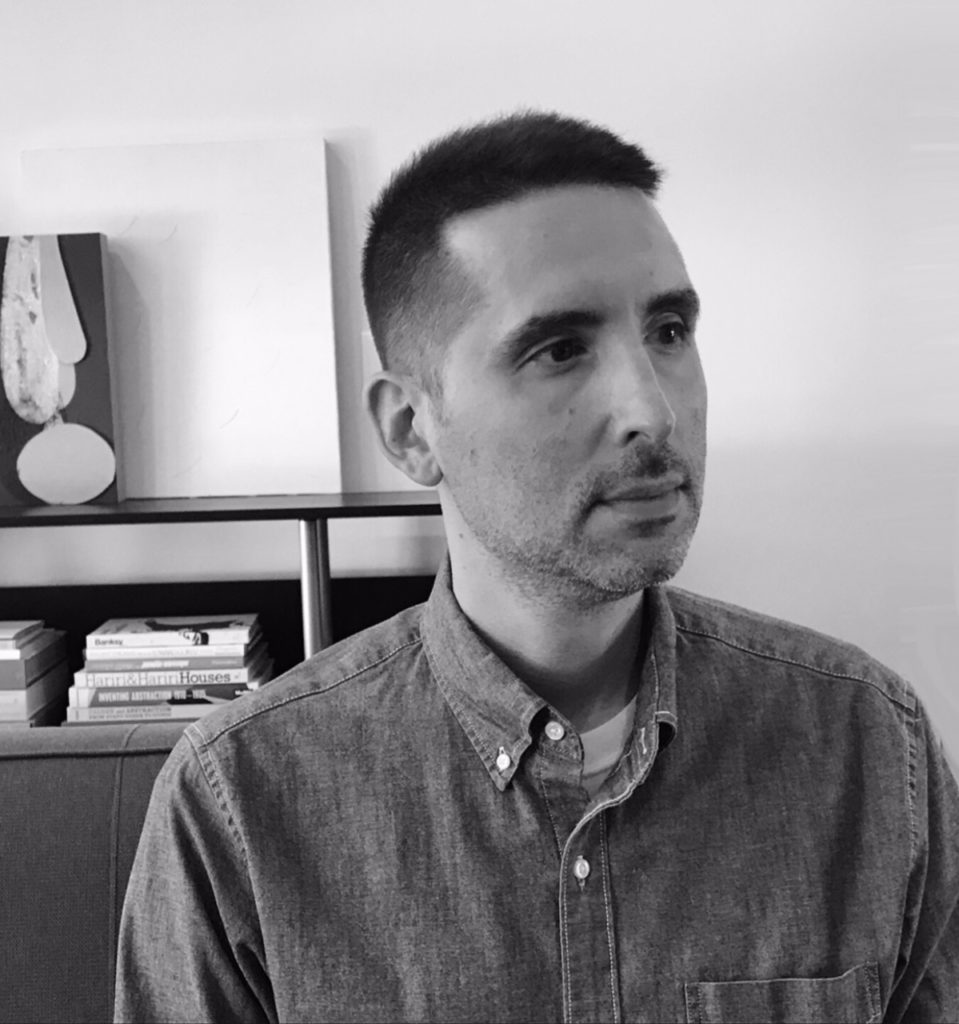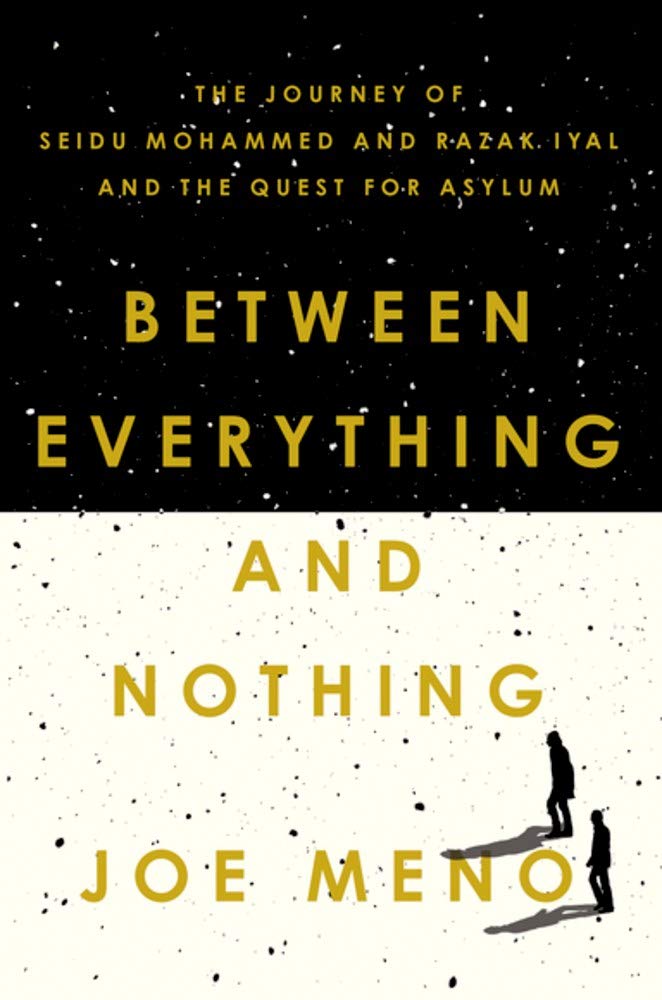TCR Talks with Joe Meno
by Matt Ellis
It’s a presidential election year, a time when we are bombarded by political hot button issues from every social and mainstream media outlet with superficial sound bites that often offer little substance but ask us to take sides nonetheless. Immigration ranks among the top. If you want to be better informed about the immigration issue, you need look no further than bestselling author Joe Meno’s debut nonfiction book, Between Everything and Nothing: The Journey of Seidu Mohammed and Razak Iyal and the Quest for Asylum.
 Meno is a fiction writer and journalist who lives in Chicago. He is the winner of the Nelson Algren Award, a Pushcart Prize, and the Great Lakes Book Award. He was a finalist for the Story Prize. The bestselling author of seven novels and two short story collections, including Marvel and a Wonder, Hairstyles of the Damned, and The Boy Detective Fails, he is a professor in the English and Creative Writing Department at Columbia College Chicago. His nonfiction book, Between Everything and Nothing, which follows the lives of two asylum seekers confronting the perils of the U.S. immigration system, was published in 2020.
Meno is a fiction writer and journalist who lives in Chicago. He is the winner of the Nelson Algren Award, a Pushcart Prize, and the Great Lakes Book Award. He was a finalist for the Story Prize. The bestselling author of seven novels and two short story collections, including Marvel and a Wonder, Hairstyles of the Damned, and The Boy Detective Fails, he is a professor in the English and Creative Writing Department at Columbia College Chicago. His nonfiction book, Between Everything and Nothing, which follows the lives of two asylum seekers confronting the perils of the U.S. immigration system, was published in 2020.
Meno took a break from pandemic-driven planning for his first ever all online curriculum—he normally teaches in person at the English and Creative Writing Department at Columbia College Chicago—to FaceTime with me about what drove him to veer from his fiction roots and the challenges of tackling such a complicated topic. But as our TCR readers know, it all starts with the story—so buckle up—this is going to be one hell of a ride:
Both of them keep walking, searching for the lights of the border. The land glistens before them but the border is nowhere in sight. They glance at each other, knowing they are lost, but all they can do is put one foot in front of the other, marking their way through the deepening drifts.
Just before Christmas in 2016, Ghanaian refugees Seidu Mohammad and Razak Iyal waded out into a Minnesota snowstorm in the dark of night in search of a flashing light they were told would guide them to what they hoped would be a final safe haven—Canada. Though both men were from the same Accra neighborhood of Nima and had made similar pilgrimages from Brazil, through Central America, and into Mexico to seek asylum in the United States, they’d met only hours before, the only two black men at the last bus stop before the border. They had spent years running for their lives. In Ghana, Seidu faced prison and a lifetime of brutality or death for being gay, and Razak’s stepbrothers were waiting to kill him over the rights to a small parcel of familial land. In the United States, instead of finding protection, they were thrown into privately-owned prisons like criminals; Razak wouldn’t earn his release for over twenty months. Ultimately, their asylum petitions were denied and they were left to choose between a possible frozen grave on a trek to Canada or a one-way ticket to an assured hell back home. Their gamble on the blizzard eventually led to the protection they sought, but they both lost parts of themselves along the way.
My first question was probably the most obvious: “How did you find this story and why haven’t I ever heard it?” Meno tells me it had been covered by the major media outlets, but only briefly. A few months later, a friend of his, an Eritrean refugee turned film and television producer, asked him to meet with the two Ghanaians, who were making a name for themselves as outspoken immigration activists in Canada. Meno agreed to interview them for an essay or an article. “When you do an interview,” he says, “you usually spend five or ten minutes feeling each other out and build rapport before you hit the record button. But even before I could throw out a softball question or establish some atmosphere, Razak just launched into telling this story about the two of them crossing on foot through the snow, losing their gloves and their hats, and about the searchlight on the US border facility. For five hours, these two men told this story in overlapping and different segments—why they left Ghana, traveling through South America, and being in detention. I almost forgot to hit record.” Razak’s narrative about his impressions of immigration while waiting at the Panamanian-Costa Rican border were particularly transfixing:
It was also infuriating that among the cacophony of so many different languages, so many different cultures, the pervading distance, the relentless uncertainty, all of it made clear that so many people from across the world were fleeing their homelands, had chosen to give everything up, under threat of life and limb. What did it say about how the world, how these distinct nations organized themselves? How could so many people be so unhappy as to risk their lives in exchange for a chance of some other way of living? Was the world really that broken? He shuddered as the answer seemed to appear in the line before him.
When Meno returned to his hotel room to comb through the recordings and his notes, he quickly realized this story needed more attention. The Ghanaians immigration experience went beyond revealing the dangers of the rain forest and roadway predators; their hardships continued long after they arrived at the U.S. border. Though the asylum system that abused Seidu and Razak preceded Trump’s inauguration, it was only getting worse. “[The Trump administration implemented] draconian immigration policies, from enabling ICE officers to go into churches and hospitals, to having Customs and Border Patrol officers misinform people who came to apply for asylum that they were no longer accepting applicants.” Meno’s tone goes from incensed to somber. “I grew up in a working-class family and went to college and was able to build a life. I felt so deeply ashamed and embarrassed by what had happened over those [first] few months.” He told me that he returned the next day for another marathon interview session and formed a partnership with the two refugees to give their voices another platform.
 One of Joe Meno’s biggest successes in Between Everything and Nothing is his adaptation of fiction-inspired structure to reveal two separate but parallel journeys as a series of staggered vignettes woven into the spine of the narrative until the point where their paths converge near the end: lost in a blinding borderland snowstorm while running from where we usually expect an immigration story to end. I ask how was able to find such a creative way to organize such a complicated story. “I was trying to capture what it was like to sit with those two men on that first day,” Meno admits. “They spoke for about five hours, moving back and forth through time, and then moving back and forth between [themselves]. That experience felt so powerful.” He started by exploring a multitude of nonfiction books to find the best way to handle two complicated stories over a period of years and across several continents. His first approaches were more linear, staying with a character for fifty to seventy-five pages and then switching, but this process seemed too jarring and prone to a repetition of similar experiences along the well-worn immigrant routes.
One of Joe Meno’s biggest successes in Between Everything and Nothing is his adaptation of fiction-inspired structure to reveal two separate but parallel journeys as a series of staggered vignettes woven into the spine of the narrative until the point where their paths converge near the end: lost in a blinding borderland snowstorm while running from where we usually expect an immigration story to end. I ask how was able to find such a creative way to organize such a complicated story. “I was trying to capture what it was like to sit with those two men on that first day,” Meno admits. “They spoke for about five hours, moving back and forth through time, and then moving back and forth between [themselves]. That experience felt so powerful.” He started by exploring a multitude of nonfiction books to find the best way to handle two complicated stories over a period of years and across several continents. His first approaches were more linear, staying with a character for fifty to seventy-five pages and then switching, but this process seemed too jarring and prone to a repetition of similar experiences along the well-worn immigrant routes.
Ultimately, he chose to focus on the bond these two men formed in that frozen crucible, caught between America and Canada, and then fanned out to explore their individual stories in short chapters. “Once I arrived at that, I was like, that’s literally how they told the story to me.” We both laugh at the irony of toiling so long over structure only to return to the most natural and original form. Through all the experiments and permutations of the book, though, Meno knew that the last leg of the journey had to be the cornerstone of the story. “How they described it is still one of the most harrowing depictions of anything I’ve ever heard someone tell me. It felt like it captured everything about the tragedy of immigration at this moment in the United States.”
As a security expert working in Guatemala, a major weigh station and starting point along the most traveled routes, I am constantly exposed to the dangerous realities of the immigrant exodus. However, it is Meno’s deep-dive exploration of the overburdened asylum system that I found most chilling, a process intended to protect the world’s most vulnerable. A system where judges are too buried to fully understand the cases, pro-bono means thousands of dollars in fees, and lengthy detentions mean high profits for the privately-owned, for-profit prisons: “Over the past two decades, the asylum process in the U.S. has slowly become its own inviolable system, an abstract nation unto itself, an invisible country nearly impossible to escape.”
“I felt like, as an American, I should be better equipped,” Meno said as we were wrapping up the interview. “I should have some knowledge about what was going on in the name of the country in which I lived.” From the first day he met Razak and Seidu and heard their stories, Joe Meno felt he had to do something. He is a writer and that is where his power lies. Mission accomplished. Inside Between Everything and Nothing beats an activist’s heart seeking positive change by providing knowledge. And we should, as Americans, feel the weight of the dark realities of our immigration system, one that has been plagued with problems for decades, not just the last presidential term. To do otherwise would be a contradiction to our collective identity, something Meno sums up best with the following:
The United States has a complicated legacy when it comes to the issue of immigration. By its very nature, it was a nation conceived by people who were migrants themselves—human beings willing to risk everything they had in order to search for something better. It has always been a nation of ceaseless movement, of people pursuing that which has yet to appear.
Between Everything and Nothing will prove to be an eye opener for most and a rude awakening for some.
 Matt Ellis is a retired Army officer serving as a security expert in Guatemala. Over the years, he’s been a HUMINT officer, counterintelligence agent, linguist, diplomat, musician, and Christmas tree trimmer (the machete kind). He’s a freelance reviewer for Publishers Weekly and was the staff screenwriter for Pacific Rim Media. His short fiction has been published at Thought Catalogue. He is studying Fiction at UCR Palm Desert’s Low-Residency MFA program in Creative Writing and Writing for the Performing Arts. Find him at www.letswriting.com.
Matt Ellis is a retired Army officer serving as a security expert in Guatemala. Over the years, he’s been a HUMINT officer, counterintelligence agent, linguist, diplomat, musician, and Christmas tree trimmer (the machete kind). He’s a freelance reviewer for Publishers Weekly and was the staff screenwriter for Pacific Rim Media. His short fiction has been published at Thought Catalogue. He is studying Fiction at UCR Palm Desert’s Low-Residency MFA program in Creative Writing and Writing for the Performing Arts. Find him at www.letswriting.com.
